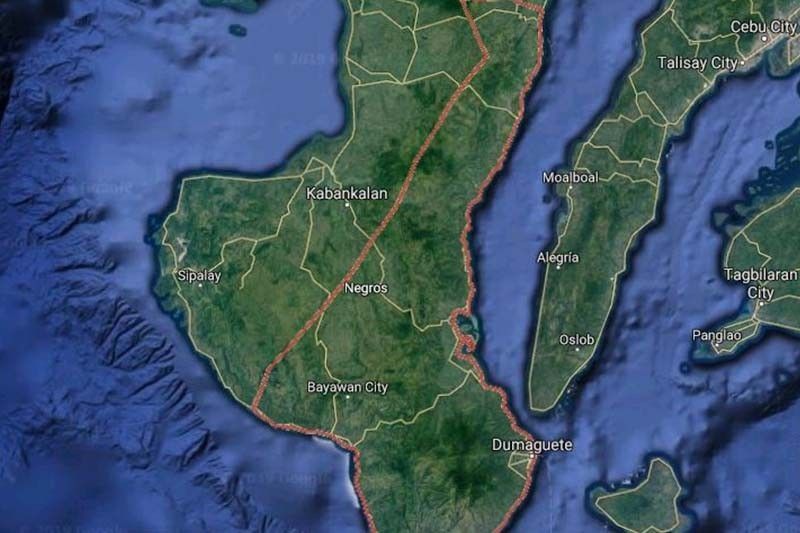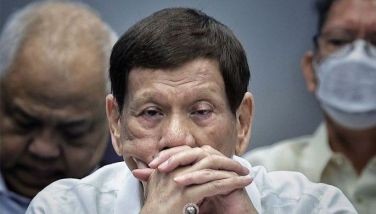Duterte rules out martial law in Negros for now, Palace says

MANILA, Philippines — Placing Negros under martial law is not an option for President Rodrigo Duterte at the moment , presidential spokesperson Salvador Panelo claimed Tuesday.
In a press conference, Panelo said he conferred with the president on Monday night. “I asked him, last night about Negros and he said: ‘You and I are lawyers, we know that we cannot just impose martial law, unless the requirements are there.”
Asked if the government is ruling out martial law in Negros, Panelo replied: “Sa ngayon, yes.”
"Because under the Constitution, there should be rebellion. Right now, it’s killing, unbridled killings are happening," he added in a mix of English and Filipino.
Panelo, early in the Duterte presidency, claimed that incorrectly the country's drug problem "has risen to a crisis of gigantic proportion that endangers the public safety hence constitutionally a declaration of martial law is valid."
Duterte 'about to do something drastic'
Duterte, on August 2, said he is "about to do something drastic." He did not elaborate on the “drastic” measure but stressed that he does not aspire to become a dictator: “Sabi ko sa inyo, wala akong ambisyon mag-diktador. On the day that I won’t step down from Malacañang, shoot me dead.”
(I am telling you, I have no ambitions to become a dictator.)
The president did not elaborate but he made the statement as he talked about the rampant killings on Negros Island, which he blamed on communist rebels.
Among those killed last month were four policemen whom the New People’s Army has admitted to killing in an ambush in Ayungon town on July 18. The rebels have disputed claims by the police, however, that the four had been tortured and executed.
Defend Negros Movement has listed 17 names who were killed in less than a week in July. These include a village chairman, a councillor, a lawyer and a one year old child.
A total of 87 killings have been recorded in the province since 2017, Defend Negros Movement also said.
READ: CHR calls for objective probe into Negros killings amid heated rhetoric
What the constitution says
The 1987 Constitution provides that the president, “in case of invasion or rebellion, when public safety requires it,” may suspend the privilege of the writ of habeas corpus or place the Philippines or any part of it under martial law.
The president must submit a report, within 48 hours since the declaration, to the Congress and the legislative body may revoke the proclamation. The Congress’ revocation “shall not be set aside by the president,” the Constitution read.
It added: “Upon the initiative of the President, the Congress may, in the same manner, extend such proclamation or suspension for a period to be determined by the Congress, if the invasion or rebellion shall persist and public safety requires.
Congress has readily agreed to the extension of martial law in Mindanao, which was declared in May 2017 in response to Maute and Abu Sayyaf terrorists attacking the capital of Lanao del Sur. Marawi was declared liberated in October 2017 but clearing operations continue and National Security Adviser Hermogenes Esperon Jr. has said he is inclined to recommend another extension.
What the Supreme Court said on Duterte's martial law
Mindanao has been under martial law for more than two years.
READ: SC upholds 3rd martial law extension
On May 23, 2017, Duterte declared martial law in Mindanao through Proclamation No. 216. This was in response to clashes in Marawi City between government forces enforcing the arrest of Abu Sayyaf leader Isnilon Hapilon.
The president has since pushed for year-long extension of the declaration: To cover the rest of 2017, then 2018 and 2019.
Different groups have challenged the legal basis of Duterte’s extension of martial law in the region before the Supreme Court, but the tribunal stood by the constitutionality of the declaration and its subsequent extension.
EXPLAINER: Mindanao martial law: Similar petitions, slightly different SC
In 2017, Duterte cited continued threats from Islamic State-linked extremists, local terrorists and communist rebels as the primary reason to justify the extension of martial law to 2018.
The National Union of Peoples' Lawyers challenged this before the SC in their petition. "According to the government itself, the CPP-NPA rebellion had not significantly impaired the functioning of civilian courts and local governments and authorities' hence said rebellion does not warrant the imposition of martial law as the constitutional standard of public safety is not met," they said.
READ: Petitioners: Duterte 'belittled' NPA threat, why extend martial law?
When the SC upheld the constitutionality of Duterte’s year-long extension of martial law in Mindanao, it said:
"The inclusion of the rebellion of the New People’s Army as basis for the further extension of martial law in Mindanao will not render it void. Undeniably, the NPA aims to establish communist rule in the country while the DAESH/ISIS-inspired rebels intend to make Mindanao the seat of ISIS power in Southeast Asia."
The SC also said that while the NPA and the DAESH/ISIS-inspired rebels—whose actions served as basis for the martial law declaration—differ in ideology, “they have shared the same purpose of overthrowing the duly constituted government.”
“The violence the NPA has continued to commit in Mindanao, as revealed by the Executive, hardly distinguish its rebels from the architects of the Marawi siege. Both have needlessly and violently caused the death of military forces and civilians, and the destruction of public and private property alike,” the SC added.
Associate Justice Noel Tijam, who has since retired from the SC, penned the ruling.
- Latest
- Trending
































